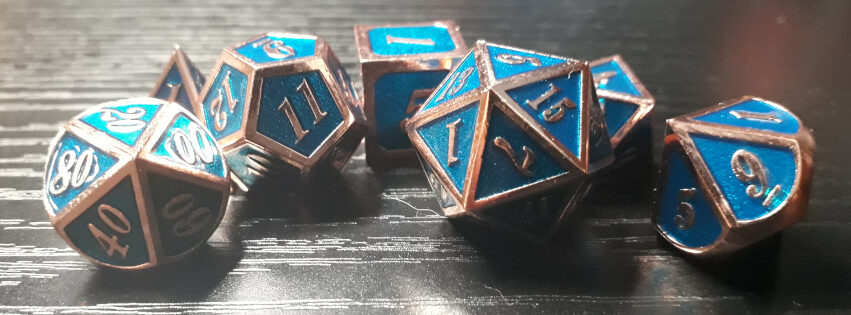Here are some house rules that our group tends to use for character creation in Dungeons and Dragons (5th edition). You might find some of them useful, so here they are…
Ability Score Generation

The core rules give three methods for generating ability scores:
- Roll 4d6 for each ability and keep the highest three.
- Take the standard array of 15, 14, 13, 12, 10, 8.
- Point-buy for scores with a total cost that allows you to purchase the standard array.
The array and point-buy options are much worse than you’d expect from rolling, but random generation gives limited control.
(4d6 drop 1) rolled six times is the baseline for me. The other methods (standard array or point buy) are well below that. The statistically average outcome of rolling is more like 16, 14, 13, 12, 10, 8, so that becomes the standard array.
A point buy the equivalent of that array needs to allow scores of 16. This cost can be set at 12 points, and the standard array costs 30 points.
So the ability score generation options available are:
- Roll (4-1)d6 six times and arrange them as desired.
- Use the (new) standard array of 16, 14, 13, 12, 10, 8, arranged as desired.
- Use a point-buy system with 30 points to spend. Costs are as in the PHB, except that you can purchase a score of 16 for 12 points.
Uses for Intelligence
Mechanically at least, Intelligence is close to being a universal dump stat. Only Wizards and Artificers use it for their core class abilities (and only Wizards in the core rules); the knowledge skills that use it are of rather narrow utility in most adventuring situations; and Intelligence saves are uncommon to say the least. Here are two ways to make Intelligence more useful at character generation time.
Intelligence-Based Warlocks
There are a lot of Charisma-based classes, and Warlocks seem the best candidate to convert to Intelligence. This change is easy to implement – just replace all mentions of Charisma with Intelligence in the class description and powers.
Bonus Proficiencies
Intelligence modifies the number of skill, tool, and language proficiencies that a character has. Characters typically start with:
- Two languages from their ancestry.
- Two skills from their background.
- Two languages and/or tool proficiencies from their background.
Each +1 bonus from Intelligence earns an extra language or tool proficiency. Two of these bonuses can be spent on an extra ‘academic’ skill. The academic skills are Arcana, History, Nature, Religion, and Medicine. I find that having more access to these skills helps to advance the plot (they often provide exposition) without increasing character power (they’re seldom used in combat or social conflicts).
A penalty to Intelligence leads to a commensurate loss of proficiencies. A character can also choose to be illiterate for one point if Intelligence penalty.
Everyone’s Special
Many campaigns place some restriction on options at character creation. My skyship campaign, for example, had limited land and so only directly supported Humans, Elves, Dwarves, and Halflings. In this case other ancestries required additional world building. To allow for such variations, and to give additional customisation options at character generation, players can choose one special thing about their character. Possible options include:
- Selecting a racial feat (from Xanathar’s Guide to Everything)
- Adding +2 to one ability score that has not previously been increased by the character’s ancestry.
- Playing an unusual race or class if there are campaign-related exceptions.
- Starting play with a minor magical item or similar resource.
- Being a member of a noble family or other similarly well-resourced group.
Final Thoughts
The intent here is to increase the ability of players to customise the Dungeons and Dragons character creation process. These options are independent of one another, so you can use them or not as suits your group or campaign.

